town of batavia
City Council holds town to wastewater limits, warns of penalties
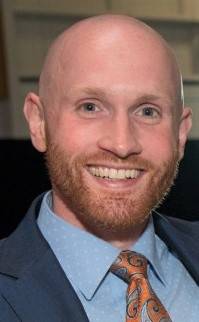
Two Town of Batavia projects — the Kings Plaza Pump Station and Force Main Upgrade — originally planned for completion in 2020 had been put on hold due to Covid-19 and increased pricing, city officials say, pushing it out to December 2021 when additional funding was available.
During that same time, the town’s wastewater flows increased to approximately 1.2 to 1.4 million gallons per day, which exceeded the town’s current contractual limit of .85 million gallons per day, as established in the Wastewater Facility Agreement dated in February 2015, city officials said.
“So basically what you’ve got, the Town of Batavia was awarded a grant from the New York State Community Development Block Grant to upgrade the Kings Plaza pump stations and make improvements to the existing water main that connects to the city's sewer system. They are over capacity right now,” Public Works Director Brett Frank said during City Council's conference meeting Monday at City Hall. “The pump station has a maximum capacity of .54 million gallons per day (MGD), and the town would like to plan for future growth … there’s concern with their current exceedance of the contractual former limits in the full capacity of the plant, and we believe we should not yet approve a capacity of one million gallons per day. This agreement will address these concerns and proposes modifications to ensure that the town adheres to the current capacity flows of point .54 MGD.”
City Council was asked to approve a resolution of agreement between the town and city of Batavia that the town will stick with an average .54 million gallons per day, and that if it goes above that, “daily monetary penalties will be levied by the city.”
City Attorney George Van Nest said that the city has “the ability to have penalties for going over that, which it’s in there, but we haven’t stipulated what those penalties would be.”
The town is also asked to agree that a new 12-inch force main will be installed from Kings Plaza Pump Station to River and South Main streets, and that the city may inspect the project.
“The upgrades at the Kings Plaza Pump Station will include a new master sewer meter,” the resolution states.
Council members Bob Bialkowski and Eugene Jankowski Jr. said they were concerned about the town paying the penalty, “and that’s not solving our problem,” Jankowski said, “and they’re getting away cheap to cause a problem for us.”
They wondered if the town should have to do its own water treatment, and Frank said that’s already in the plan.
“We’re actually engaging in those engineering services to potentially expand the wastewater treatment plant, and that would all be at the cost of the town of the Batavia to do those engineering services,” he said.
The matter was forwarded on to a business meeting that followed, and Council approved the resolution for the city manager to execute a related state Department of Environmental Conservation BSP-5 form.
Sponsored Post: Reliant Real Estate has land for sale

Click here for more information; 0 Galloway Road in the Town of Batavia.
BDC expands land portfolio for redevelopment
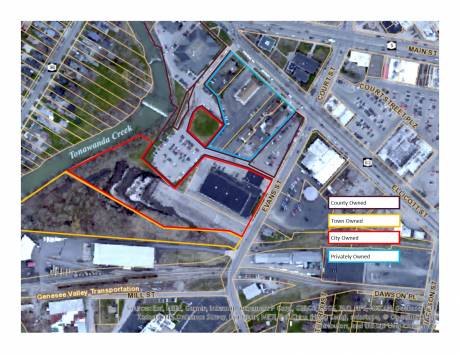
Seven months after approving the acquisition of property between Tonawanda Creek and Evans Street, Batavia Development Corporation received the word it hoped for: yes.
A somewhat unusual sale, this one involved the Town of Batavia, which owned the 4.26-acre parcel tucked behind and alongside the McCarthy ice arena.
Batavia Town Board approved the sale of land this week, and agreed to sell it to BDC for $1. It falls under the name Creek Park LLC, which is a subdivision of BDC, and will be marketed for land development. That is, after the unknowns are known, she said.
“First step after closing is to initiate the Phase II sampling, which is necessary for determining if there is a presence of any pollutants,” Hathaway said Wednesday. “Once results of the sampling are received, the BDC will have a pathway to whether the parcel is to be marketed as a Greenfield or a Brownfield; each offering different developer incentives.”
An example is Savarino Companies, which went through Creek Park LLC for its Ellicott Station housing project. BDC worked to get that project into a Brownfield development, which is identified as potentially needing remediation to remove toxic materials, and also comes with financial incentives for doing so.
As for the town property, the BDC has not yet closed on it.
“The conveyance was approved by the Town of Batavia and is currently in the Permissive Referendum period,” she said. “This period will expire on April 18; an anticipated closing is to follow as soon as can be scheduled.”
BDC uses the city of Batavia’s planning initiatives “as our roadmap,” Hathaway said, and one is the Brownfield Opportunity Area (BOA) study and program. Since the Creek Park area is vacant and underutilized, she said, the BOA has identified it as a “prime area” for redevelopment.
“The BOA program focuses on adaptive re-use of a site through environmental assessments, followed by clean-up efforts should the parcel be determined a Brownfield,” she said. “The Creek Park acquisition follows the mission of the BDC to encourage reuse of underutilized real estate.”
BDC voted to pursue purchasing the town property in August 2022.
Map provided by BDC.
GC Health Department launches 'Healthy Neighborhoods'
Press Release:
The Genesee County Health Department received $477,000 in funding from the New York State Department of Health (NYSDOH) to implement the Healthy Neighborhoods Program (HNP) for the years 2022 to 2027.
Residents in the Town and City of Batavia are eligible to participate in the program and the goal is to visit 1,000 households over five years. The program offers home evaluations for asthma triggers, indoor air quality, lead-based paint hazards, fire risks, and other health hazards. At the evaluations, residents are
educated on asthma management, childhood lead poisoning prevention, carbon monoxide poisoning, radon gas, fire safety and prevention, and other home safety issues.Free safety and cleaning supplies are also available to eligible participants. There are four main goals of Healthy Neighborhoods Program:
1) Reduce hospital visits due to asthma: According to the NYSDOH Asthma Dashboard from 2017 to 2019, residents of the zip code 14020 (which includes the City and Town of Batavia) visited an emergency department for an asthma attack at a 28% higher rate than the average for Genesee County. The Healthy
Neighborhoods Program aims to provide participants with tools to better manage their asthma and avoid emergency room visits by evaluating their symptoms, triggers, and medication usage. Participants are encouraged to ask their primary care doctor to create a written plan to follow during an asthma attack.2) Prevent childhood lead poisoning: The majority of housing in Batavia was built before 1978, which is when the federal government banned consumer use of lead-based paint. In partnership with the Genesee County Health Department’s Lead Poisoning Prevention Program, homes will be assessed for lead-based paint hazards and lead poisoning prevention education will be provided.
3) Improve indoor air quality: According to the NYSDOH, about 1,800 people in New York visit an emergency room due to carbon monoxide poisoning each year. Carbon monoxide poisoning is more common during the winter months due to use of heating sources. The Healthy Neighborhoods Program provides education on carbon monoxide poisoning, radon gas, smoking cessation, and pest management. In addition, eligible participants may receive carbon monoxide detectors, radon test kits, and cleaning supplies.
4) Reduce household injuries from fires and accidents: Residential fires are more common in the winter months, according to research by the National Fire Protection Association. A small fire can become a major fire in less than a minute, so working smoke detectors are crucial to alert residents so they can escape in time. The Healthy Neighborhoods Program encourages participants to practice fire escape routes. Participants may even receive free smoke detectors and small fire extinguishers.
For more information or to make a referral to the program, call Genesee County HNP staff at 585-344-2580 ext. 5519 or visit www.GOHealthNY.org.
Future convenience store planned for Town of Batavia
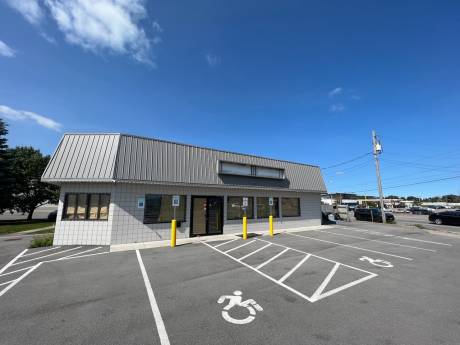
If you have driven past the former Clor’s building on West Main Street Road and thought you saw a sign that later disappeared, you’re not seeing things.
A sign for F&M Convenience store was briefly put on the front of 4169 West Main Street Rd. in the town of Batavia. The site, which sits on a triangular piece of property between Top’s Friendly Markets and Valu Plaza, has been leased, Town Building Inspector Daniel Lang said.
Unfortunately, Ali Musa, the renter, has not taken his business through the proper channels of the town planning board yet, Lang said. His business is set to go before the Town Planning Board next week. Meanwhile, the process has been explained to the new occupant at least a few times, Lang said, yet Musa put the sign up, then took it down as directed, followed by putting up blue and white lights around the front windows. Those have also been taken down.
Property owner Benderson Development is leasing the 1,737-square-foot building to Musa after an 18-month gap in occupants. Musa has also been stocking the future store, although some of his products may not pass town code, Lang said.
Cannabis sales are legal in the city, but not in the town, which vetoed an option for cannabis dispensaries. Apparently, Musa intends to sell related products at the convenience store.
A representative of Benderson Development was unable to provide any details about the renter's plans.
The site was built in 2004 and has served to house several various operations, most notably Clor’s Meat Market, which moved there in 2009. Longtime owner Chuck Gugel sold the business to Kathleen (Kate) Gonzalez in 2013, who closed it by the end of that year.
Other former occupants have been Pizza Joe’s and Georgie Porgies.
Photo: After an 18-month vacancy, the building at 4169 Main Street Rd., Batavia, has been leased for use as a convenience store, but has not been through the Town Planning Board process yet. Photo by Howard Owens.
Batavia pizzeria owner 'shocked' with town's response to his concerns over Benderson application
The Town of Batavia engineer says he has cleared up miscommunication with the Lewiston Road businessman who has been speaking out against the proposed construction of a pair of restaurants with drive-thru lanes on the south side of the former Kmart parking lot near Park Road.
Steve Mountain today addressed comments made by pizzeria owner Jerry Arena earlier in the week. Appearing at the Batavia Town Board meeting, Arena said that it was his impression that the town was requesting Benderson Development Corp. to resubmit its plans.
Arena has charged Benderson with submitting what he calls a “falsified application,” primarily referring to the company checking boxes on its documentation that there are adequate bicycle lanes and pedestrian walkways along the Lewiston Road corridor extending to Veterans Memorial Drive.
During the meeting, Arena said that Mountain indicated, in a phone call to him, that the town was looking for a revised application from Benderson. Town Supervisor Gregory Post responded by saying that he wasn’t aware of that.
“… the town engineer told me that Benderson was going to have to resubmit their application. And I was going to ask you guys about starting that process all over again,” Arena said.
He went on to say that he was very disappointed that town officials don't grasp that traffic is going to be much worse.
“I'm kind of in shock here. I was really happy that maybe …you're coming to a realization that it's a safety issue – a severe safety issue,” Arena said, reiterating that he continues to consider filing a temporary injunction to block the proposed development.
Contacted today, Mountain said he told Arena that Benderson needs to submit its engineering plans to him.
“The Town Planning Board approves the project contingent on my final review and approval, which is typical for every project,” Mountain said. “We'll go back and forth with the plans – review them and have some minor comments. All that engineering stuff – water and sewer and all those things.”
But as far as Benderson having to submit a new project application, Mountain said that is not the case.
He said he spoke with Arena a couple days ago and “better explained to him” that no new application was coming – just a revision of the engineering comments on the plans.
When asked if he thought there was a safety issue with the traffic in that area, Mountain said a traffic study consultant and state Department of Transportation officials had no concerns.
“We did note, in my comments back to them, however, that we need to look at – with the DOT – the southbound lane on Lewiston, where there’s only left turn arrows to the old Kmart,” he said. “We feel that should be left and right turn arrows, similar to what is near Tim Hortons and Tops. That’s the only thing, traffic-wise, that we’re looking at.”
Mountain said that the Park Road Reconstruction Project has resulted in more vehicle congestion, but he sees traffic flowing better once that is completed.
“The DOT will be going around the county, updating things, but we feel the Lewiston Road/Route 5 section is still acceptable,” he said.
He did mention that the town’s future projections include a new road from Lewiston Road to West Main Street Road (Route 5), north of the current intersection.
“That’s in our Comprehensive Master Plan,” Mountain said.
Batavia Town Board sets public hearing on solar law
The Batavia Town Board on Wednesday night set a public hearing for 7 p.m. April 20 on Local Law No. 2 of 2022 – a provision entitled, “A Local Law to Amend the Town of Batavia Zoning Ordinance for Solar Energy Systems.”
The public hearing, which will take place at the Town Hall at 3833 West Main St. Rd., comes on the heels of several months of work by a committee charged with revising the ordinance on the installation of solar systems.
CLICK HERE to access a final draft of the updated solar law.
Supervisor Gregory Post thanked Town Council member Chad Zambito, committee chair, for the group’s efforts, with Zambito acknowledging the input of Building Inspector Dan Lang in the process.
In other action, the board passed resolutions to:
- Adopt Local Law No. 1 of 2022 which changes the zoning in a portion of the Genesee Valley Agri-Business Park on East Main Street Road from Commercial to Industrial Park. This action means that all of the park is now zoned appropriately as an IP District.
- Change a work order between Concrete Applied Technologies Corp. to included a $123,576.60 charge for the installation of a new, 12-inch watermain under Lewiston Road (Route 63) in an existing pipe as part of the Park Road Reconstruction Project.
CATCO is the general contract for the project on 1.2 miles of Park Road between Route 63 and Route 98.
Additionally, the board approved a contract for $55,000 for Ravi Engineering and Land Surveying to provide inspection services for the installation of watermain on Park Road, which also is part of the major project.
- Appoint -- as reported first on The Batavian -- Raymond Tourt as highway superintendent, effective April 4 through the end of the year. His pay for the part-time, salaried position has been set at the pro-rated amount of $15,076.
Tourt, who has announced his retirement at the City of Batavia’s maintenance superintendent, moved into the elected position following the resignation of Thomas Lichtenthal, whose term expires on Dec. 31, 2025.
Town board to vote on appointment of Tourt as highway superintendent, public hearing on solar ordinance
The Batavia Town Board is expected to appoint Ray Tourt as the town’s highway superintendent at its monthly meeting on Wednesday night.
A resolution included in the meeting agenda has Tourt, who has announced his retirement as City of Batavia Bureau of Maintenance superintendent, moving into the position, effective April 4.
A city employee since 1999, Tourt’s last day with the city is March 30.
Town Supervisor Gregory Post today said that Tourt will serve out the remainder of this year before being placed on the ballot to run for the part-time, salaried position for three more years. It pays around $20,000.
Tourt would be replacing Tom Lichtenthal, who resigned, but continues to work for the town in an engineering capacity.
Also, on the agenda for Wednesday’s meeting, which starts at 7 p.m. at the Town Hall on West Main Street Road, is the setting of a public hearing for 7 p.m. April 20 (at the Town Hall) on “A Local Law to Amend the Town of Batavia Zoning Ordinance for Solar Energy Systems.”
For the past several months, the town’s solar committee worked to revise the law governing solar systems in the municipality and has come up with a final draft for the public’s consideration.
Previously: Town planners: solar law process is on the right track
Previously: Town solar committee asked to 'revisit' setback distances
WROTB directors approve sewer pipe replacement; Park Road project expected to start in couple weeks
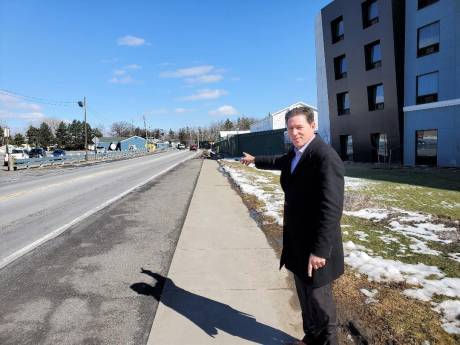
Directors of Western Regional Off-Track Betting Corp. have approved spending up to $190,212 to install a new sewer pipe extending from the Genesee Park Place apartments to an area in front of the Hotel at Batavia Downs on Park Road.
The board, at its meeting last week, approved a resolution to accept a proposal by Town of Batavia officials to put in the pipe as part of the Park Road Reconstruction Project that is set to get underway this month.
“We believe the sewer pipe project will cost around $260,000 and we’ve made a request to owners of the Park Place apartments to split the cost,” WROTB President Henry Wojtaszek said today. “The board agreed to a maximum of $190,000 to take into account any overruns or contingencies, and in case we have to do it on our own.”
Wojtaszek said putting in the sewer line will eliminate the need to use an old pump station just south of Alex’s Place and will result in lower costs to the corporation.
Town Engineer Steve Mountain agreed, adding that it would be more efficient if that work is done as part of the major renovation of the road.
“We posed that to them if they wanted to consider it now rather than later,” Mountain said. “Now's the time -- before the road is built.”
WROTB previously agreed to spend about $450,000 in enhancements to the $4.077 million project -- improvements such as trees, street lights, increasing the size of the sidewalks and replacing the fence along the parking lots.
Mountain said the main water pipe is being delivered today or tomorrow and work will start in a couple weeks. Catco (Concrete Applied Technologies Corp.) Construction of Alden is general contractor for the project, which is expected to take several months, possibly until the end of the year.
“I guess you could say this is the calm before the storm,” Mountain said. “Everything will get started when the weather starts breaking.”
He noted that there will be lane shutdowns during construction but traffic will be maintained.
“There'll be times when it'll be stop and go for sure,” he advised.
The project calls for the installation of new pavement, curbs and curbing from Lewiston Road to Richmond Avenue with sidewalks on both sides of Park Road; overlaying of pavement and installation of sidewalks on one side of the road from Richmond Avenue to Route 98, and installation of new water lines and street lights on Park Road between Route 63 and Richmond Avenue.
Photo: WROTB President Henry Wojtaszek points north on Park Road, where a new sewer line running from Genesee Park Place apartments to Batavia Downs Gaming will be installed as part of the Park Road Reconstruction Project. Photo by Mike Pettinella.
Batavia Downs preparing for Park Road project; June 10 concert to benefit Ricky Palermo Foundation
The president of Western Regional Off-Track Betting Corp. this morning said he expects work on the Park Road Reconstruction Project to start in March.
“Everything seems to be in place,” Henry Wojtaszek said following the monthly board of directors meeting. “The preliminary work that the town (of Batavia) had to do up here at the corner of Lewiston and Park was completed, and … we anticipate a March start on the construction and probably go through to the end of summer, sometime in August or September.”
Wojtaszek said WROTB is prepared to pay around $450,000 for additional enhancements along Park Road – such as trees and street lights and increasing the size of the sidewalks – and also is working with town officials on issues related to the sewer system.
“We’re considering sewer enhancements instead of a pump station, which would be very costly to maintain,” he said.
The $4.077 million project consists of a complete renovation of Park Road – new pavement, curbs, sidewalks, water lines and street lights -- between Route 63 (Lewiston Road) and Route 98 (Oak Street).
Town Assistant Engineer Tom Lichtenthal previously reported that completion is set for December of this year.
In other developments from today’s WROTB meeting:
- While sports betting on cell phones is now legal in New York State, Wojtaszek said he doesn’t expect that service to come to gaming facilities until early next year.
“We will have the ability to have kiosks here on site for sports betting next January and we anticipate taking advantage of that and providing that service for our customers,” he said. “But right now, we’re having our customers come in and they're betting the games on the phone or watching them in our 34 Rush.”
He said New York has already overtaken all other states to become the leading sports betting state in the nation. “And it took all of two weeks,” he said, noting that it became legal on Jan. 8.
- A June 10 concert by Bruce in the USA, a Bruce Springsteen tribute band, will benefit the Ricky Palermo Foundation. A lifelong Genesee County resident, Palermo has been instrumental in raising millions of dollars for spinal injury research.
“One hundred percent of the ticket proceeds will go to Ricky’s foundation,” said Marketing Director Ryan Hasenauer. “Tickets are on sale now.”
For more information, go to www.bataviaconcerts.com.
- WROTB distributed $65,215 in surcharges to member municipalities in November, Chief Financial Officer Jacquelyne Leach reported.
On the branch side, revenue increased by $12 million in 2021 compared to 2020, but was down $1.1 million from 2019. The handle of Batavia Bets, the online platform, went up by $1.2 million in 2021 compared to the previous year.
- Directors approved a resolution to purchase 840 gaming chairs and stools from Gary Platt Mfg. of Reno, Nev., for $346,000.
Legislature set to appoint LeRoyan Wujcik as county attorney; Town of Batavia to hire Earl on part-time basis

Personnel moves -- per resolutions to be considered at meetings tonight and previously passed by the Wyoming County Board of Supervisors -- are as follows:
- James Wujcik of Le Roy (photo at right) is being appointed as Genesee County attorney through Dec. 31, 2023, replacing Kevin Earl, who has served in that capacity for the past five years;
- Earl is being hired as counsel to the supervisor for the Town of Batavia on a part-time (20 hours per week) basis;
- Jennifer Wilkinson of Attica has been appointed as Wyoming County attorney, replacing Wujcik, who has served as counsel to that county’s Board of Supervisors for the past eight years. Both Wilkinson and Wujcik are lawyers with the Attica firm of Dadd, Nelson, Wilkinson & Wujcik.
- Jerry Ader of Clarence is being reappointed as Genesee County public defender through Dec. 31, 2023.
COUNTY SET TO ‘MOVE FORWARD’
County Legislature Chair Rochelle Stein cited Wujcik’s experience as a county attorney as he steps into the role of helping to facilitate key projects facing the municipality in the near future.
“Jim has just finished his term with serving Wyoming County – not as a full-time attorney – and we are looking forward to having him come on board (in a full-time capacity),” she said. “He was interested (in the Genesee County job) and we were interested, and we believe that we're going to continue to work on behalf of the taxpayers here in Genesee County -- in a really smart, effective and efficient way.”

“This was mutual on both sides,” she said. “He has really performed a great service to the county for the last five years. We have gone through some … amazing things while he sat in that office, and there's the craziness of this pandemic.”
She mentioned the addition of a corporate compliance officer, progress on the new county jail, 40-year sales tax agreement and the water agreement with towns and villages as major accomplishments.
“We just wish him (Earl) all the best as he transitions into this new role,” she said.
Earl, contacted by telephone moments ago, issued the following statement:
“I thoroughly enjoyed my work with the county and all the county employees, and I am grateful for this opportunity with the Town of Batavia on a part-time basis as part of my semi-retirement strategy.”
TOWN CREATES NEW POSITION
The Batavia Town Board is set to create the counsel to the supervisor position tonight and hire Earl, a former attorney for the town and longtime Batavia resident, at a rate of $51.52 per hour, effective January 10.
Town Supervisor Gregory Post said the decision was predicated upon the additional volume of legal work coming into the town coupled with the desire of current Town Attorney Andrew Meier, a Medina resident with a private practice, to decrease his workload.
Post added that a “number of line items in our budget are dedicated to legal and we are in a good position to enter into an agreement with Kevin for his services.”
The position will be evaluated after six months, Post added.
“There are things that have been on the table for six or seven months that haven't been attended to, and we’ve got two new projects that are been grant funded in the last 30 days.” Post said. “We have pretty good vibes that more development is on the way.”
Post noted that Wujcik represents the town on code enforcement and building inspection matters, but expects that he will be giving that up in his new role as Genesee County attorney.
The supervisor had high praise for Earl, who, he said, “did an unbelievable job for us for so many years.”
“I have great respect for Kevin,” Post said. “And when I found that he would be available, he and I had a conversation and I talked it over with my counsel and my staff. And we feel as though we're finding a path of trying to save some money.”
Post said the normal hourly rate for contracting with attorneys is around $200.
“Kevin will be in the office – and will be immediately available to the building department, to code enforcement and inspectors, to the engineering staff, to the town clerk and be able to work with planning and zoning,” he said. “He will help us move through these new public works projects and navigate contracts and insurance service agreements for the next year.”
Town solar committee asked to 'revisit' setback distances
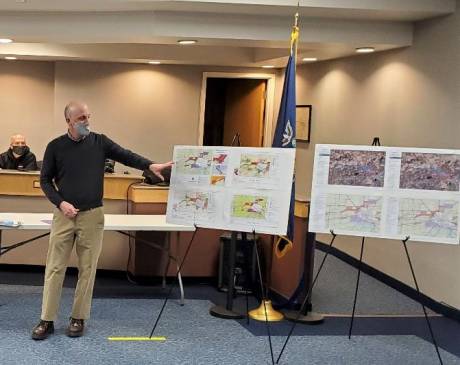
Members of a committee charged with updating the Town of Batavia’s solar law on Wednesday night acknowledged that a compromise on setback distance requirements may be in order after hearing from two couples seeking to place ground-mounted systems on their property.
Speaking at an informational meeting at the Town Hall on West Main Street Road, Dan Reuter, a Corfu resident, said he has issues over the 200-foot setback criteria listed in the final draft of the town’s Solar Energy Local Law.
Reuter and his wife, Kathy, own 68 acres on Alexander Road (Route 98) in the Town of Batavia.
“The setbacks proposal is extremely constraining,” Reuter said, adding that such a condition would put an end to his plan to place a 1.8-megawatt solar array on 9 acres of his property. “It will make it not viable.”
As currently written, the final draft stipulates that Tier 3 systems shall meet the following requirements:
- Be setback from any non-participating property line by 200 feet;
- Be setback from any participating property line by 20 feet;
- Be setback from any adjoining, participating property existing structure by 30 feet;
- Be setback from any adjoining, non-participating structure by 500 feet.
Reuter said his property is vacant and, for the most part, unusable, farm land that already is limited in scope due to requirements of the New York State Department of Environmental Conservation. He said that he is looking to put in the solar system to assist in the couple’s retirement.
“We ask that you would revisit that,” he said, noting that 200 feet “would kill us” but that a 50-foot setback would work.
John and Kerry Hylkema said they applied in 2016 for a permit to place solar on their property on Alexander Road.
“We saw other solar farms go in,” Kerry said. “and we’ve been waiting and waiting.”
Her husband said he also disagreed with the setback requirements, and asked for the committee’s “consideration to work with us.”
Buffalo attorney Charles Malcomb, representing solar developer Renewable Properties on behalf of the Reuters and Hylkemas, referred to a letter that he wrote to the committee highlighting other projects where the setback was less than 200 feet.
“The main issue is the setback from non-participating properties,” he said. “Two hundred feet is a real problem.”
Malcomb pointed to projects in the towns of Alabama and Sardinia where a 50-foot setback was in place.
“We think that’s a sufficient setback,” he said, noting that screening provisions would help to “hide” the panels – one of the goals of the solar law.
At that point, Dan Lang, who also is the town’s building inspector, asked other committee members to weigh in on the 200-foot setback. He then proposed keeping the 200-foot limit on the front and changing it to 50 feet on the side and rear.
“The intent is to get these away from roads and houses,” he said.
Committee member Nancy Brach, a town resident, asked Malcomb to modify his renderings to show various distances, and he agreed that he would fulfill that request.
The committee has been working on a new solar law – one that would mesh with the town’s Comprehensive Plan – for about a year.
Drew Reilly (photo above) of Wendel Companies of Williamsville is the group’s consultant and he spoke at length last night about the progress it has made.
Reilly said that the solar environment is changing rapidly.
“If you have a solar law and it’s more than three years old, it’s probably outdated,” he said. “NYSERDA (New York State Energy Research and Development Authority) is even updating its law” (because it doesn’t address everything).
Lang said the committee will take another look at topics brought up last night (others included the percentage of Smart Growth land to be used for solar and the role of planning boards and zoning boards of appeals in the process) and submit the revised law to the Batavia Town Board sometime next month.
Town Supervisor Gregory Post, who was in attendance, said he hopes to have the law passed by April. Before that can happen, the law needs to go through a State Environmental Quality Review, review by the Genesee County Planning Board and Town Planning Board, and a public hearing.
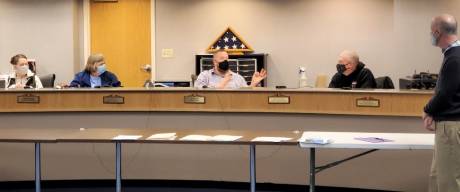
Photo: Town of Batavia solar committee members, from left, Brittany Witkop, Nancy Brach, Dan Lang, Paul McCullough. Reilly is at right. Photos by Mike Pettinella.
Previously: Town of Batavia committee drafts revised solar energy law, sets informational meeting for Dec. 29
Town of Batavia committee drafts revised solar energy law, sets informational meeting for Dec. 29
After taking several months to review the Town of Batavia’s regulations governing the installation of solar systems, a seven-member committee working with a Williamsville consulting firm is ready to share its recommendations with the public.
An informational session is scheduled for 6 p.m. on Dec. 29 at the Town Hall on West Main Street Road.
The final draft of the town’s revised Solar Energy Local Law is available for viewing on the Town of Batavia website.
Town Board member Chad Zambito is the chair of the committee that also includes Town Building Inspector Dan Lang, Town Zoning Board members Steve Tanner, Don Partridge and Paul McCullough, Town Zoning Board of Appeals member Brittany Witkop and town resident Nancy Brach.
Drew Reilly of Wendel Companies served as the group’s consultant.
Zambito said the committee used the New York State Model Solar Energy Law as a basis for the town’s law, with some modifications. He said he hopes to receive feedback from residents at next week’s meeting.
According to the document, the town has the authority to develop a solar code through town law and Section 20 of the Municipal Home Rule Law of the State of New York, which authorize the town “to adopt zoning provisions that advance and protect the health, safety and welfare of the community, and, in accordance with the Town Law of New York State, to make provision for, so far as conditions may permit, the accommodation of solar energy systems and equipment and access to sunlight necessary therefore.”
It advances a five-fold “statement of purpose” – emphasizing the need to capitalize on renewable energy, reducing electricity costs to residential and commercial customers, increasing employment and business development, mitigating solar’s effects on agriculture and the environment and linking to the town’s Comprehensive Plan.
The revised law also lists solar term definitions, time frames, safety guidelines, decommissioning (end of use) procedures, maintenance/fees and enforcement/penalty provisions.
The bulk of the document is devoted to “permitting requirements” for the four levels of solar systems – Tier 1, Tier 2, Tier 3 and Tier 4.
- Tier 1 systems are defined as roof-mounted solar panels and new building-integrated systems, and are must meet design, glare and height guidelines.
- Tier 2 systems, such as accessory structures, also have to comply with glare, setback, height, screening, visibility, equipment placement and lot size requirements. Both Tier 1 and Tier 2 systems are permitted in all zoning districts and are not subject to site plan reviews as long as the specific criteria are in order.
- Tier 3 (larger) systems are permitted through the issuance of a Special Use Permit within the Agricultural Residential zoning district. They are subject to additional requirements, including maximum percentage of land use, written application, public hearing, underground utility lines, vehicular paths, signage, glare, lighting, tree cutting, screening/landscaping, noise, decommissioning and security.
- Tier 4 systems along the line of those proposed for widespread areas in Byron and Oakfield/Elba, also need a Special Use Permit. These may qualify for a Solar Energy System PILOT (Payment in Lieu of Taxes) and will require a Host Community Agreement as determined by the Town Board. Additional restrictions on large-scale Tier 4 systems include submission of an Agricultural Impact Statement, Economic Impact Analysis and Host Community Agreement proposal.
Town Board sets fire protection public hearing for Nov. 17, contracts with Alabama for STAMP code enforcement
A public hearing on the Town of Batavia’s 2022 contract with the Town of Batavia Fire Department is scheduled for 7 p.m. Nov. 17 at the Town Hall, 3833 West Main St. Rd.
The proposed contract, which would take effect on Jan. 1, calls for the town to pay the fire department $1,185,265 for fire protection for all of next year.
Town residents fund the fire department through a separate special district tax, which is expected to remain at $2.34 per thousand of assessed valuation – the same as 2021.
The town board announced the public hearing date at its meeting on Wednesday night.
In other action, the town board:
- Approved an agreement in which the town will provide code enforcement services to the Town of Alabama, specifically for development at the WNY Science & Technology Advanced Manufacturing Park.
According to the resolution, the Town of Alabama shall pay the Town of Batavia $55.44 per hour during normal business hours Monday through Friday. The charge for field inspections outside of that timeframe will be $83.16 per hour. Mileage incurred by enforcement officers also will be reimbursed.
- Completed the preliminary 2022 budget process, setting the property tax rate at $2.51 per thousand of assessed valuation. The rate is a 12 percent decrease from 2021, and will generate $1,236,000 in property taxes – the same amount as last year.
The sewer rate remains the same as 2021 -- at $7.09 per 1,000 gallons used -- while the water rate for both residential and agricultural consumers is going up by 2 percent – to $6.32 and $5.12 per 1,000 gallons, respectively.
Salaries for elected officials are as follows:
- Supervisor Gregory Post, $40,000.
- Deputy Supervisor Dan Underhill, $18,000.
- Council members Patti Michalak, Chad Zambito and Sharon White, $12,000.
- Town Clerk/Tax Collector Teressa Morasco, $74,541.
- Highway Superintendent Tom Lichtenthal, $20,101.
- Town Justices Lisa Funke and Andrew Young, $28,840.
No one from the public spoke at public hearings on the budget, sewer and water rates on Wednesday.
Town of Batavia earns high marks for investment strategy
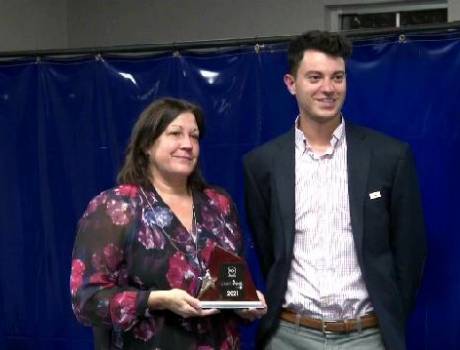
The Town of Batavia’s money management policies are having a significant impact upon its bottom line, so much so that it is being recognized by the Pittsford firm that has helped guide the municipality’s investments in recent years.
At Wednesday night’s Special Town Board meeting at the Town Hall on West Main Street Road, Alex DeRosa, relationship specialist with CashVest by three+one, presented the town with the “90+ CashVest Award” which is given to public entities that received a CashVest score of 90 or higher for four consecutive quarters.
“This score takes into consideration everything from the way the town receives payments, makes payments, what you're doing with your cash while it's at the bank, ensuring you have the appropriate bank account structure and a fair banking relationship,” DeRosa said. “The town has hit this mark above 90, not only just for four quarters, but for actually more than eight quarters consecutively.”
DeRosa said the town has gone “above and beyond the normal line of duty.”
“I don't think there's anything in legislation or law that states a town must do everything they can to maximize the value of cash; it just seems like the right thing to do,” he said. “But over the past 18 months, we've actually seen audits from the New York State Comptroller on some small towns, villages and school districts that really gave those towns a red mark on their audit saying they didn't go out and try to maximize value, they did not talk to multiple things, they did not have cash flow forecasts into the future.
“And that's the type of thing that can make headline news, not only for finance staff, but the whole town board and the town as a whole. This work is appreciated by three+one because of our mission. And it should be appreciated by every taxpayer in the Town of Batavia, that you all are going above and beyond to consistently maximize that value.”
Town Supervisor Gregory Post said he believed the town has earned almost $300,000 in unanticipated interest on investments since contracting with three+one.
“… I don't have the numbers exactly in front of me, but I believe our last quarterly report shows that since our inception of working collaboratively on this account have realized nearly $300,000 in interest above and beyond what was anticipated or budgeted,” Post said. “So, that's real dollars and real cash that have assisted us in our migration through the COVID pandemic as well as into the 2022 fiscal year.”
Photo: Hiedi Librock, secretary to the Town of Batavia supervisor, accepts the 90+ CashVest Award from Alex DeRosa of CashVest by three+one. Photo by Alecia Kaus.
Supply chain issues push start of Park Road Reconstruction Project back to spring 2022
The “new normal” has become a reality for the Park Road Reconstruction Project.
Tom Lichtenthal, assistant engineer for the Town of Batavia, this morning said the start of the $4.077 million renovation of Park Road between Route 63 (Lewiston Road) and Route 98 (Oak Street) has been pushed back until next spring due to supply chain issues caused by the COVID-19 pandemic.
“This is the result of COVID, just like we’ve seen for the last year and a half to two years in trying to get materials,” Lichtenthal said. “It’s the new normal, if you will, and it was not unexpected.”
During a pre-construction meeting last week with representatives of general contractor Catco (Concrete Applied Technologies Corp.) Construction of Alden, Lichtenthal learned that the pipe for the watermain won’t be delivered for another 12 weeks.
“That pushes the start out to mid-January, which is not a good time for this type of work,” he said. “Installation of the pipe is still the first order of business, but it’s likely delayed until the spring of 2022.”
Lichtenthal said the late start is not expected to extend the timeline for the project’s completion, which has been set for December 2022.
The scope of the work includes installation of new pavement, curbs and curbing from Lewiston Road to Richmond Avenue with sidewalks on both sides of Park Road; overlaying of pavement and installation of sidewalks on one side of the road from Richmond Avenue to Route 98, and installation of new water lines and street lights on Park Road between Route 63 and Richmond Avenue.
Previously: WROTB, Town of Batavia agree on Park Road items
Previously: Town board OKs measures to support Park Road project
Town Board looking to opt out of marijuana dispensaries, consumption sites due to lack of information

“I don’t think there’s enough information from the State of New York to enter into something that we could never get out of,” Town Supervisor Gregory Post said following the monthly board meeting at the Town Hall on West Main Street Road. “The bottom line is that we can always opt in to it when we have more details and it is something that we can administer.”
Post said he was concerned that “a decision made by five people (the Batavia Town Board) probably isn’t a clear and transparent representation of the whole community.”
If a local law to opt out is passed following the public hearing set for 7:10 p.m. on Nov. 17 at the Town Hall, it could lead to a permissive referendum organized by residents who disagree with its decision.
“People opposing that law could get together and find their way to the ballot and ask the community whether they want this or not,” Post said. “In my opinion, this is too early in the game … and jump into this thing not know what the down-the-road consequences and financial implications are.”
The supervisor did acknowledge that eventually opting in to the new law could be “lucrative” to the town, which would receive 3 percent of the sales tax collected on cannabis transactions. The state would get 9 percent and Genesee County 1 percent.
“The county, which will be burdened with 100 percent of the cost of mitigating through mental health services, probation and any of the issues that come up from sales to minors – all of the cost and expense to the community through the health department, ultimately will receive only 25 percent of that (4 percent to municipalities),” he explained.
Post also brought up the fact that marijuana continues to be against the law at the federal level, and that regular testing of commercial truck drivers, who have to be free of substance use, will continue.
“The federal oversight and management of some of our largest employers, such as Graham, O-At-Ka Milk, HP Hood, those that are making food and are considered strategic investments have to be compliant,” he said. “It’s assumed that you’re OK to consume these (marijuana) commodities if they’re legalized in the town, and then go to work and find out you can’t work because you failed a drug test.
“We’re seeing as many as 50 percent of the drivers failing the drug tests because their assumption is if it’s legal, then I don’t have a problem. But yet, it is a problem.”
Signed into law by former Gov. Andrew Cuomo on March 31, the MRTA paves the way to an estimated $1 billion industry with expected annual revenue of $350 million and the creation of between 30,000 and 60,000 jobs.
The legislation permits adult use of cannabis for those 21 years of age and up – people who may possess, display, purchase, obtain or transport up to 3 ounces of flower or 24 grams of concentrated cannabis.
It also expands New York’s existing medical marijuana program and immediately allows eligible users to smoke cannabis in public wherever tobacco is allowed.
Consumption is not allowed in schools, federal lands, workplaces or in vehicles as the federal government still has jurisdiction in those places.
The two types of retail sites are retail dispensaries, which could be storefronts to buy products for home consumption and adult use consumption sites, and lounge-like locations for purchase and use on-site.
Municipalities have until Dec. 31 to opt out of any dispensary or on-site consumption site within their jurisdiction.
Previously: County manager sounds off against sales tax diversion, misguided cannabis excise tax distribution
WROTB, Town of Batavia agree on Park Road items
Western Regional Off-Track Betting Corp. and the Town of Batavia have come to an agreement concerning enhanced aesthetics and maintenance on and around Batavia Downs Gaming & Hotel on Park Road.
WROTB President Henry Wojtaszek and Town Supervisor Gregory Post both reported that a productive discussion took place Wednesday as both entities prepare for the start of the Park Road Improvement Project later this fall.
Reconstruction of the street -- from Lewiston Road to Oak Street – is a $4.3 million project, with the bulk of the cost covered by federal and state aid.
Negotiations have been taking place in recent weeks over contracts covering WROTB’s financial contribution for requesting additional trees and lighting and details of the town’s cost for having Batavia Downs’ employees to maintain trees, street lights and sidewalks and for snowplowing once the project is complete.
“We met with the town yesterday and we’re good to go,” Wojtaszek said. “We just had to work out some details of the agreement.”
Post concurred, stating that an attorney review of the language in the agreement has been completed.
“It really wasn’t about the money, it was more about getting the proper wording,” he said. “We look forward to continuing our strong partnership with Batavia Downs.”
Last week, the Batavia Town Board tabled a resolution that set WROTB’s payment for aesthetics at $486,870, with Post indicating that they were close to finalizing the contract. He and Wojtaszek today said that they have agreed on that figure.
In other developments from today’s WROTB directors’ meeting:
- The board received an update on the armed robbery that took place on Aug. 28 at the Wehrle Drive OTB parlor. According to Amherst Police, a male suspect entered the building, fired a gun shot and fled on foot with an unknown amount of cash. WROTB employees installed a full security door afterwards.
- Batavia Downs’ revenue in August resulted in a distribution of $73,637 to the corporation’s municipalities.
E-Z bet handle this year, through August, is up $2.3 million compared to 2020 and up $765,000 compared to 2019.
Batavia Bets’ handle in August was $1.8 million, down $337,000 compared to August 2020, and was $966,000 through Sept. 19, down $376,000 compared to September 2020. For the year, handle is $13 million, an increase of almost $1.6 million from 2020.
- The board approved contracts with two Batavia-based companies: a one-year agreement with Applied Business Systems in the amount of $82,434 for marketing mailers and a pact through the end of the year for $22,500 with Extreme Streetwear for Buffalo Mafia apparel to be sold at Batavia Downs Gaming’s Lucky Treasures store.
Town resident invited to learn more about the process after suggesting an increase in sales tax rate
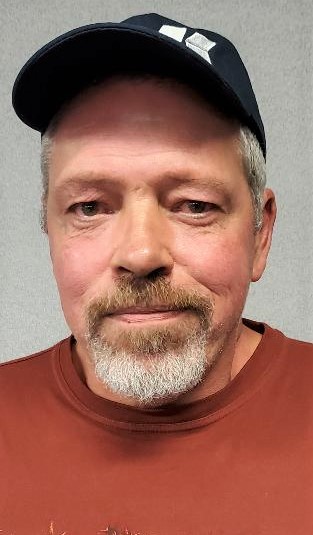
With that question toward the end of Wednesday night’s Batavia Town Board meeting, Lewiston Road resident Bill Sutton triggered a 15-minute discussion with Town Supervisor Gregory Post about sales and property taxes, and New York’s tax cap.
Sutton, (photo at right), a truck driver for Kistner Concrete, said he noticed that the meeting agenda included a resolution calling for an override of the New York State tax cap – the limit on the amount of real property taxes that may be levied by the town as it prepares its 2022 budget.
He said he was concerned that property taxes will increase and thought that bumping up the sales tax from 8 to 8.25 percent could be a way to prevent that from happening.
Pointing out that Erie County’s sales tax is at 8.75 percent, Sutton said he wondered if the extra ¼ percent in sales tax could be put in the town’s budget “so that citizens in the town don’t have to pay higher property tax.”
“Why can’t we benefit from that? Why can’t the Town of Batavia implement a little more sales tax to compensate for this, instead of property owners and businesses picking up the slack?” he asked.
TWO SALES TAX JURISDICTIONS
In his response, Town Supervisor Gregory Post said he appreciated Sutton’s questions and went on to explain that towns or villages do not have the authority to impose sales tax.
“There are two entities that are eligible to collect sales tax. One is Genesee County and one is the City of Batavia,” Post responded. “Traditionally, over the last 20 or 30 years, there has been a collaboration between those two entities to allow the county to collect all of the sales tax and then distribute 50 percent of those revenues collected or some portion of that 50 percent to the communities on an ad valorem basis.
“Which means that communities will get a percentage of the sales taxes collected by Genesee County – whether it’s 8 percent or 8 ¼ or 8 ½ or 8 ¾. Those are distributed based on the communities’ assessed valuation – taxable assessed valuation.”
Post mentioned the agreement between Genesee County and the City of Batavia that provides the city with a minimum of 14 percent share of all the sales tax revenue generated in the county. That agreement also benefits the county’s towns and villages which, by virtue of a revision last month, will share $10 million in sales tax revenue annually for the next 38 years.
Per that agreement, the Town of Batavia’s assessed value qualifies it for about 16 percent of that amount – the actual figure is $1,687,937 – and that is substantially more than the other municipalities. The Town of Darien, site of Six Flags Darien Lake, is next at $970,992, followed by the Town of Le Roy at $822,260.
The supervisor explained that the town is supported by sales taxes “and the sales tax revenues have traditionally been twice what the property tax collection levy was.”
“So, for every dollar collected in property taxes, we have been benefited by a dollar and a half to two dollars in sales tax revenues already,” he said. “And that sales tax is paid by (in part) by citizens not living in the Town of Batavia …”
'LOOKING DOWN THE ROAD'
Sutton said that satisfied that part of his question, but added that he is “looking down the road (because) here we are today – we have a shortfall.”
He continued on his point that many people from outside the town come to the town to shop, and that the town should benefit more from having to deal with extra traffic and for having many “employment opportunities.”
“There has to be something we can do as a town to increase sales tax,” he said. “There has to be something that we can go forward doing this to make it even more beneficial to live in the town – to bring a business in from outside.”
Post replied by asking him to consider, “How much benefit does Genesee County get by having a lower sales tax rate to attract shoppers from counties that have a higher sales tax rate?”
“We have spent a lot of time looking at the consequence; right now, we’re an attractive site for equipment sales, heavy equipment. We just had a groundbreaking this week (LandPro),” Post offered.
“I’m looking at the larger scale sales of automobiles and heavy equipment, and if you’re selling a million dollar bulldozer and you’re selling it because your sales tax are 8 percent instead of 8 ¾ percent, and they’re buying it and taking delivery here, we’re getting the benefit of some of those revenues that we wouldn’t get if our sales tax rate was the same as it was in another county.”
Sutton said if Genesee County went to 8.25 percent it still would be lower than Erie County (but more than Monroe County, which also is at 8 percent).
Post offered to continue the debate with Sutton, inviting him to attend a weekly (Wednesday at 5 p.m.) board workshop.
“I am happy to hear your perspective and your comments … and I’m happy to see the participation,” the supervisor said.
Sutton acknowledged that he doesn’t have access to all the dollar amounts, but pressed on with his view that the Town of Batavia has a quality of living that other communities don’t have, especially an abundance of shopping locations.
“Why can’t be benefit from this so that our children, grandchildren and great-grandchildren will also have that benefit going forward?” he asked. “We will prevent the shortfall by adding the .25 percent sales tax across the board to make it fair for not only the residences and the businesses – for everybody – to keep the property tax down that will draw business in from the outside and everybody will contribute.”
'NO OBLIGATION TO SHARE'
Post then brought up the fact that Genesee County has “absolutely no obligation to share one dime of sales tax revenue with any community.”
“They are entitled to keep 100 percent of it and it is only through the strict negotiations over the last 20 years by this board and our predecessors to come to some rational agreement where the county gets what they need to sustain their operation and not defer maintenance, and the communities in the county are benefited by the apportionment of sales taxes that they are,” he explained.
He then said he believes that Genesee County probably distributes more in sales tax to its towns and villages than another other county in New York State.
“There might be one or two other counties that do a better job with sales tax distribution than Genesee County, but locally they take 10 million dollars in revenue they collect in sales tax and they give it back to the towns to subsidize town and village operations to maintain a lower (property) tax rate.”
Post then went back to the resolution to override the state property tax cap, calling it “a statement that our community has been strategic and has been looking down the road five, 10 and 15 years financially, and retained by these resolutions annually the ability to manage our assets and modify our cash flow to meet the needs of our community so that we’re not bound and restricted by New York State and prevented from maintaining infrastructure that is key to being an attractive community to developers both international site selectors and local developers.”
The board set a public hearing on the tax cap override for 7 p.m. Oct. 20 at the Batavia Town Hall, 3833 West Main St. Rd.
Post thanked Sutton for sharing his thoughts, adding that he is “part of this community and your job as a citizen is to participate.”
Following the meeting, Post said that although it is early in the 2022 budget process, he does not expect the town’s property tax rate to increase.
The 2021 tax rate was set at $2.85 per thousand of assessed value, meaning that a home assessed at $100,000, for example, would pay $285 in town taxes for the year. The town also imposes a fire district tax, which was $2.34 per thousand this year.
Photo by Mike Pettinella.

